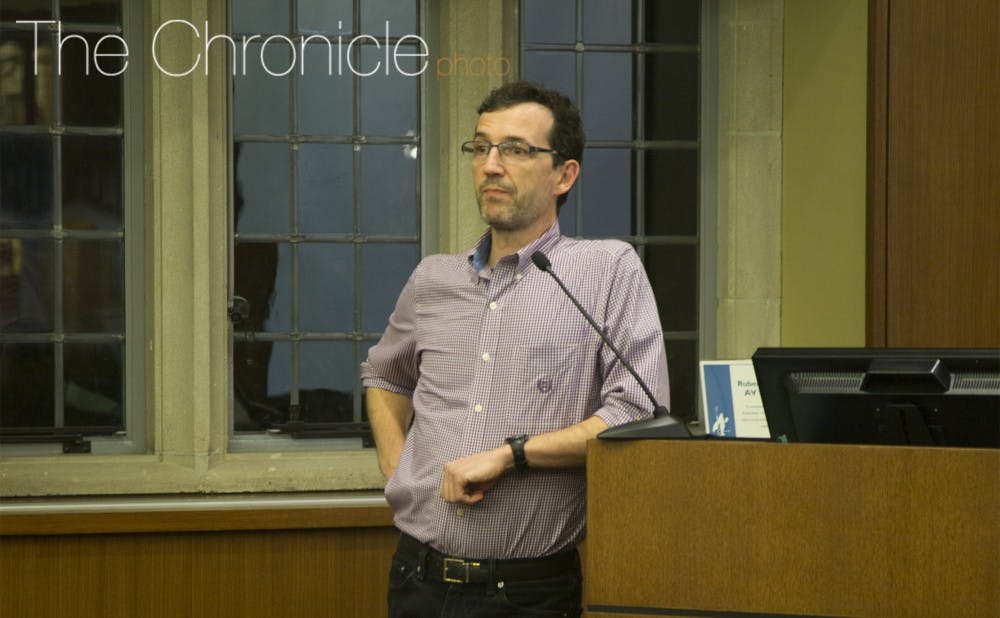In the midst of an ongoing debate about the future of the nation's health care system, Duke professor Peter Ubel discussed the limitations of the current system and encouraged bipartisan solutions at a talk Monday.
Ubel, the Madge and Dennis T. McLawhorn University professor of business administration, medicine and public policy, suggested that policymakers should seek to achieve a minimum health care standard for the country. Solutions from both conservative and liberal politicians could be successful, he noted.
“I really think we have a right to a decent minimum of health care in this country. We ought to promote that right,” Ubel said. “There are liberal and conservative ways to meet that goal. I don't really care that much [about] how we meet the goal, but let's meet it.”
After Republicans maintained their majorities in both the House of Representatives and Senate during the 2016 elections, several prominent government officials—including President Donald Trump—have promised to repeal the current framework of Obamacare, but their plans for replacing the act remain unclear.
Ubel said that although the law's future is unclear, Republicans may favor a consumer-oriented replacement, which would provide Americans more choice in their coverage and make the sector more privatized. He added that this approach, if chosen, could potentially have a successful outcome. He pointed to countries like Germany, which has a model with both the private and public sectors playing a role.
“If we're going to move toward a more consumeristic health care system, I'm okay with that as long as it's compassionate consumerism,” he said.
Keeping consumers informed of treatment options and quality control measures would be an important aspect of such policies, Ubel said. He added that most patients are often too uninformed to judge the health care options available to them.
In emergency situations, patients may not have the time or state of mind to debate treatment options, he added.
"When I have crushing chest pain, I'm not going to get on a website and try to figure out the cost of [cardiac treatment] at different places. I'm going to call 9-1-1 and go to the nearest hospital,” Ubel said. “And so we have to think about the limits of consumerism. The more that people have time to shop for medical care and have available information to do that, that's where we should emphasize consumerism.”
Special interest politics could limit the success of both conservative and liberal policies, Ubel said, criticizing the lack of action legislators have taken against price inflation by both hospitals and the pharmaceutical industry.
"If you're really trying to make this affordable—to help people get at least a basic level of health care—you need to fight the special interests that want prices to stay high," Ubel said. "And I don't think either party has taken that on. I think they're both afraid to, and frankly, they got a lot of campaign funding from those groups."
An audience member asked Ubel about medical innovation in the pharmaceutical industry and whether the government will continue to incentivize companies for tackling rare or “orphan” diseases.
Under the Orphan Drug Act, companies are awarded tax breaks and are given extended patents for developing drugs for treatment of rare diseases.
Ubel said he was concerned about how the act’s benefits may soon become unsustainable due to advances in precision medicine—a field that seeks to target the treatment of a disease to a patient's unique biological circumstances.
Learning more about the genetics of more common diseases such as breast cancer could form the basis of treatments for subtypes of diseases, he said, which might make incentivizing treatment for these subtypes unaffordable for the federal government.
"With the increase of personalized medicine, especially genomic diagnosis, everything is becoming an orphan disease,” Ubel said. “The worry is that we're going to have more orphan diseases than we can afford, so we may have to revisit [the Orphan Drug Act]."
Get The Chronicle straight to your inbox
Sign up for our weekly newsletter. Cancel at any time.

